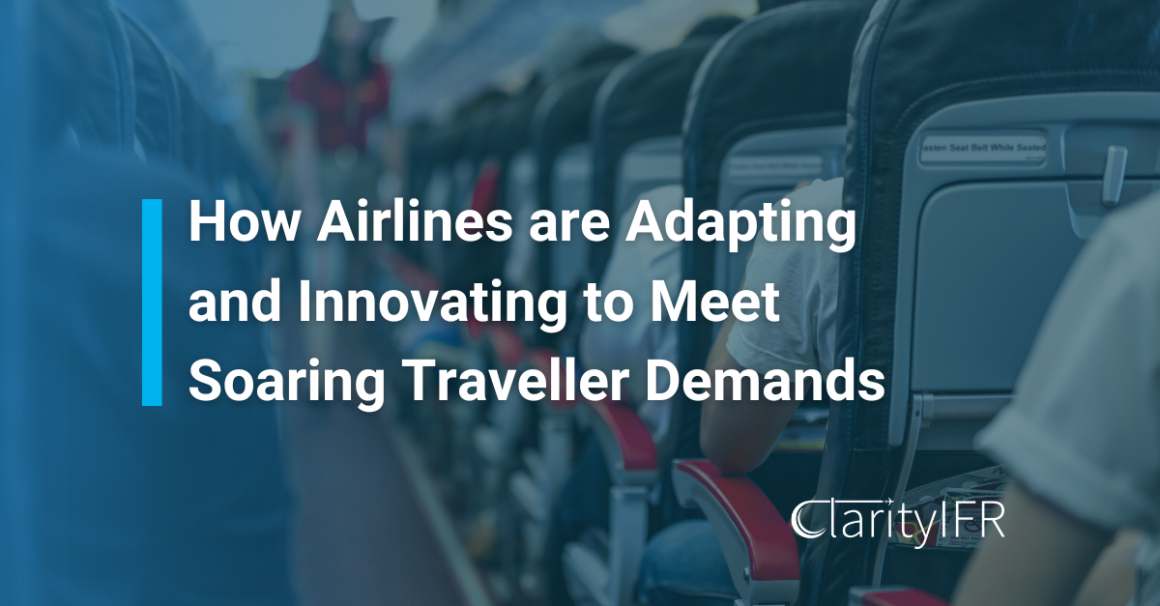In the ever-evolving landscape of air travel, one question remains; How can technology be harnessed to attract passengers? As the travel industry navigates the challenges posed by the pandemic and shifting traveller demands, it has been forced to adapt to a new era of aviation.
Our recent participation at the World Aviation Festival shed light on this ongoing transformation. Through presentations, product showcases, panel discussions, and informal conversations, it’s certain that the pandemic and subsequent recovery have highlighted the overall importance that the digitalisation of airport operations has taken off in the quest to enhance overall customer experience.
In fact, did you know, a staggering 93% of airports are currently investing in technology? According to Luis Felipe de Oliveira, Director General of Airports Council International. The pandemic, and the subsequent journey toward recovery has magnified the critical role of digitalisation in ensuring a seamless customer experience.
One exciting development is the utilisation of predictive data and insights. These resources empower travel providers in making more aligned content and campaign decisions based on traveller behaviour. While traffic is rebounding, according to IATA, reaching 90.5% of pre-pandemic levels globally, airlines must adapt to this surge in demand. Airlines are now challenged to cater to an ever-growing passenger base while simultaneously improving the passenger experience, reducing environmental impact, and maximising profitability.
Understanding the Surge in Traveller Demand
As more individuals take to the skies, airlines find themselves under increasing pressure to meet evolving traveller expectations. This surge in demand isn’t limited to just flying but also the seamless experience through the entire journey. Expectations are high, and airlines are feeling the need to deliver more than before.
Data: The Catalyst of Change
Although the data itself remains consistent, the technology underpinning its management has transformed. Today it’s more scalable, reliable, and flexible. Airlines are leveraging this technology to empower their employees to provide superior customer experiences, ultimately driving profitability.
Airlines have access to a wealth of data enriched with individual purchasing decisions. By prioritising data collection and analysis, airlines can adapt and respond to today’s market conditions and real-time purchasing behaviours. This approach leads to:
- Enhanced offers based on continuous customer searches, purchasing history, and pricing algorithms, thereby improving customer engagement and satisfaction.
- Customers benefiting from tailored, attractive offers, leading to increased conversion rates for airlines.
- Improved customer choice based on demand forecasting will optimise sell-through rates, reducing costs, and enhancing supply chain efficiency.
The Future of Data in Travel
The future of data for airlines is set to be transformative, with several key developments shaping the landscape to meet traveller demand from now on. Here are some aspects that highlight what the future holds for airlines:
Pathway to Net Zero: The aviation sector’s commitment to reaching net zero carbon emissions by 2050 is a monumental undertaking for the aviation sector in the global fight against climate change. To fulfil this commitment, extensive efforts are vital, with a key role played by the integration of cutting-edge IT innovations.
Crucially, AI stands at the forefront of this transformative journey. AI is not only a driving force behind improved operational efficiency but also a revolutionary catalyst for enhancing the passenger experience. Simultaneously, it serves as powerful tool in reducing the environmental impact of air travel. AI is the linchpin, guiding the aviation industry toward its sustainability goals while simultaneously offering a superior travel experience.
End-to-End Integration is key: Data integration is more than just a buzzword; it’s the keystone that holds the potential to revolutionise airline operations. By harmonising data from various sources, including weather conditions, air traffic, aircraft performance, and passenger preferences, airlines can gain holistic insights into their operations. This comprehensive view enables them to optimise flight routes, reduce excess inventory, enhance fuel efficiency, and improve overall sustainability.
In essence, the aviation sector is gradually recognising that end-to-end data integration is the key to unlocking a future of greater efficiency, reduced waste, and informed decision-making.
Passport to the future… Hyper-personalisation fuels the traveller journey: Embracing advanced technologies like hyper-personalisation, driven by real-time data, analytics, AI, and automation, is key to reimagining the passenger experience. This approach reduces costs, improves efficiency, and connects customers with their preferences, enhancing ancillary operations.
Airlines can benefit by optimising their in-flight retail based on passenger preferences and purchasing history, stocking fewer items, improving efficiency, and boosting sales. Hyper-personalisation has the potential to make air travel more enjoyable and profitable for both airlines and passengers. It supports sustainability by reducing unnecessary inventory, creating custom shopping experiences, optimising pricing strategies, and cutting operational costs through automation and AI-driven decision-making.
In a world where the sky’s no longer the limit, data-driven innovation is propelling airlines forward. As passenger numbers soar and the thirst for exploration grows, airlines are not only adapting to the demand but also enhancing the passenger experience, reducing their environmental footprint, and increasing profitability through the intelligent use of data and technology.
Embracing a data-driven approach, we craft customer-centric, context-aware, and enticing offers for inflight catering and duty-free items. Our end-to-end approach, from product sourcing to supply chain management, aligns with predictive demand and buying behaviours, ensuring the right offer reaches the right flight for the right customer. This strategic shift towards intelligent in-flight retailing not only enhances passenger experiences but also plays a vital role in promoting sustainability. Airlines are leveraging data-driven practices to significantly reduce emissions, contributing positively to the environment.
The future of travel is data-driven, and airlines are at the forefront of this transformative journey to meet traveller demands.
Related Articles
Driving a Hyper-personalisation Strategy to win the next generation of travellers
How IT Innovations Propel Airlines Towards Net Zero Carbon Emissions by 2050
Harnessing AI to Minimise the Environmental Impact of Inflight Retail
Charting a Greener Future for Airlines and Passenger-Centric Solutions

